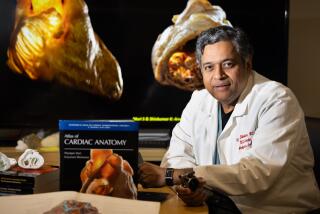Benjamin Paul, 94; Stanford Professor Pioneered Medical Anthropology
- Share via
Benjamin David Paul, a Stanford University professor whom many consider the founding father of medical anthropology, has died. He was 94.
Paul died May 24 in Atlanta from complications after a cerebral hemorrhage, Stanford announced.
The educator was teaching at Harvard in 1955 when he published a textbook that became influential in the then-emerging field of medical anthropology, which applies anthropological and other social science methods to questions about health and healing.
“Health, Culture and Community: Case Studies of Public Reactions to Health Programs” examined how traditional communities struggled to accept health innovations and suggested that international aid programs would be more effective if they considered local cultural beliefs.
The textbook is still used.
While earning his doctorate, Paul began fieldwork in cultural anthropology in San Pedro La Laguna, Guatemala. The town of 2,500 could be reached only by canoe when he and his wife spent a year there in 1941.
“Margaret Mead told him to take pictures over the fence, so that’s what he did,” said Barbara Rogoff, a developmental psychologist at UC Santa Cruz who met Paul in Guatemala more than 30 years ago and collaborated with him over the years.
Paul would return to the region in the Guatemalan highlands more than 20 times, last visiting when he was 89.
He wrote extensively about the recruitment and practices of midwives as well as marriage customs, political change and medical and religious trends.
When residents of the village began disappearing during the country’s military dictatorship, he investigated the incidents in a noted account that came out in 1988. “The Operation of a Death Squad in San Pedro La Laguna” was co-written with William J. Demarest.
“I was afraid for him to publish that paper, but his response was, ‘I am almost 80 years old. What do I have to fear?’ ” Rogoff recalled. “I was really impressed with his commitment.”
Born in New York City in 1911, Paul soon moved with his Jewish immigrant parents to an agricultural commune in Utah. After the commune failed, the family had a farm in Indiana.
He earned his bachelor’s degree and doctorate from the University of Chicago and served as a clinical psychologist in the Army from 1944 to 1946.
Paul began teaching at Harvard in 1946 and directed the Harvard School of Public Health’s social science program from 1951 to 1962. A year later, he joined Stanford; he headed its department of anthropology from 1967 to 1971. Paul became a professor emeritus in 1976.
He lived in Stanford until moving to Atlanta two years ago. His wife, Lois, died in 1975.
In San Pedro La Laguna, church bells tolled after residents heard about the death of the curious and talkative professor with the mischievous smile, Rogoff said.
In addition to the trove of ethnographic photographs stored in the town library, another reminder of the couple remains: the town’s first secondary school, named after the Pauls and built on land they donated.
Paul is survived by a son, Robert A. Paul, an anthropologist and dean of Emory University’s undergraduate college; a daughter, Janice Paul; a brother, Elias; a sister, Fannie Zuckerburg; and two grandchildren.
A memorial service will be held at 1 p.m. Monday in the faculty club at Stanford.






